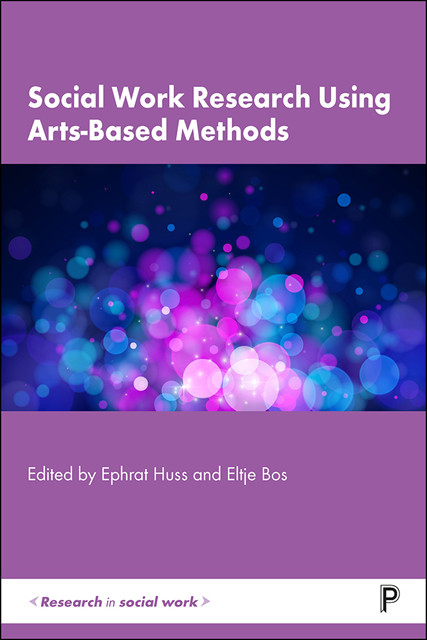Book contents
- Frontmatter
- Dedication
- Contents
- List of figures and tables
- Notes on contributors
- Introduction
- Section I Arts-based research as a method to understand and give voice to marginalised groups
- Section II Using arts-based research to listen to, and give voice to, children in social work
- Section III Arts-based research as a way for researchers and community members to understand communities
- Epilogue
- Index
7 - Arts-based methods to support and reveal new mothers’ and families’ experiences: a positive parenting and feminist approach
Published online by Cambridge University Press: 13 October 2022
- Frontmatter
- Dedication
- Contents
- List of figures and tables
- Notes on contributors
- Introduction
- Section I Arts-based research as a method to understand and give voice to marginalised groups
- Section II Using arts-based research to listen to, and give voice to, children in social work
- Section III Arts-based research as a way for researchers and community members to understand communities
- Epilogue
- Index
Summary
Introduction
The situation of families and the transition to new motherhood are experiencing deep changes globally. Parental roles and family models are transforming from traditional ones. There is a growing concern about family needs and family's socialising and educational function, which has led to the development of the positive parenting approach and family support measures, focusing on supporting parenting roles for optimal child development.
But, what are mothers’ needs and challenges within their parenting role? What is their perspective of what parenting means? We have observed that despite the advances made in terms of women's rights and equality, motherhood still has profound implications for women's lives and identities, as it is related to strong social expectations. Usually, maternal care is undertaken from within the physiological and medical frameworks, but such care rarely takes into account the emotional, relational, and cultural aspects of the transition to motherhood. In fact, cultural representations mostly show an idealised image of motherhood, making real mothers’ first-hand experiences invisible.
From an intersectional feminist perspective, there is the need to develop new references and the collective imagination of what being a mother means. What kind of models of motherhood do we want to create? What could be the role of arts-based methods for understanding the needs of new mothers and family support?
This chapter will present a research project set in Spain which focused on exploring and evaluating arts-based support for new mothers and families (Hervas Hermida, 2018). The programme is in response to the Comprehensive Plan for Family Support 2015– 2017 (Council of Ministers of Spain, 2015) and is focused on addressing the socio-cultural dimensions of reproduction and nurturing. This chapter will focus on arts-based methods to evaluate an arts-based intervention program (McNiff, 1998). Its assumption is that artsbased
methods can better evaluate an intervention that is based on the artist.
Researching the impact of art therapy for mothers and families as a way to support positive parenting using arts-based methods
The Comprehensive Plan for Family Support 2015– 2017 (2015), drafted by the Council of Ministers of Spain, offers a diagnosis of the situation of Spanish families, and the need for coordinated actions that include both psychosocial and prevention measures.
- Type
- Chapter
- Information
- Social Work Research Using Arts-Based Methods , pp. 77 - 86Publisher: Bristol University PressPrint publication year: 2022

